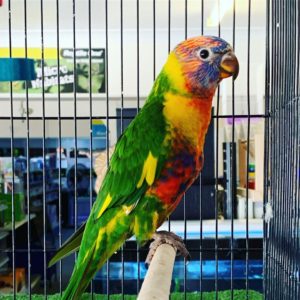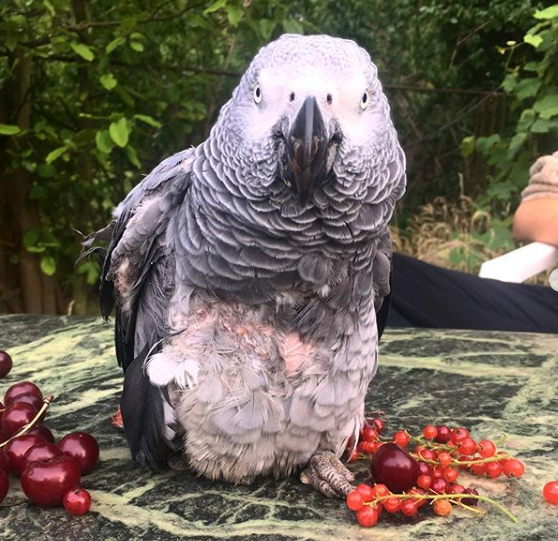How Parrots Speak Why do parrots talk? What is the finest parrot to talk about? Speaking parrots How to Train your Parrot How does my parrot start to speak? Do parrots understand what you are saying? How do you train a parrot?
Top 5 Talking Bird Species
- The African grey parrot
- Amazon parrots
- Budgies
- Indian ringneck parakeets
- Quaker parrots
How do parrots talk?
Parrots talk to create sounds by modifying the air that flows across the syrinx. The syrinx is where the trachea is divided into the lungs.
African Greys and Amazon parrots are very adept at mimicking human language and noises.
When I think a parrot has no lips or teeth, both my Greys can never imitate the timbre of my husband’s voice.
Why do parrots talk?
Pssitacines (the family of parrots) and Passerines (the families of songbirds) use their voices to warn, court, interact with their nestlings, and fight to protect land.
Most domesticated parrots are separated from their wild cousins for only a few generations.
The sounds they create vary enormously. Some of them are so nice to our ears that Mozart recorded the starling of his pet
Wild parrots communicate using whistles, chirps, and squawks. How do these birds’ young convert the noises into recognized human sounds? On this fascinating subject, there is a growing body of research examining birds’ vocal abilities and sense of rhythm.
What is the best-talking parrot?
- African Greys
- Timneh Greys
- Yellow Naped Amazons
African Greys are especially great at speaking.
Find out how much it costs to purchase a parrot from African Grey.
African Greys and Amazons have the most extensive human word vocabulary, and Amazons are our music’s greatest musicians. Despite being fluent speakers, African Greys rarely speak on cue.
Magnificent cockatoos and magnificent macaws are not the finest communicators.
They’ll talk a few phrases at most. But they’re quite intelligent. They are not the best pet parrots for a household environment unless you have enough free time and space.
Best small to medium-sized talking parrot
- The African Grey is the best medium-sized parrot for talking.
- Some of the small parrots are communicating well. It was thought that one champion budget,
- Puck (who died in 1974), had a vocabulary of 1700 words. But the budgerigar’s voice is loud, piping, and difficult to understand.
- Tame Cockatiels will also speak. However, they will have a limited vocabulary once again.
How to train a parrot to speak
- Parrots, like humans, are vocal learners, which means they hear noises and then imitate them.
- You should therefore teach your parrot as if it were a child.
- Repeat the sounds, and when they get something correct, praise them. When she’s happy with you, your parrot will recognize you and want to repeat it.
- Steve Hartman, a parrot expert, proposes that you “speak frequently with your parrot.” Constant verbal communication can help your bird develop into a smart, independent, and self-confident individual.
- Explain what you’re doing while cleaning the cage, cooking lunch, or watching TV.
You’ll notice a parrot infant babble like a child. The parents are pleased, and the baby learns when she says Da-da or Mum-mum. So, you should think of it as educating a child to speak about the process.
Talking in your parrot’s language
Some caregivers attempt to communicate with parrots, which is practically impossible. Try it on your own. I have a whistling contact with my Greys. With the macaws, I tried a couple of squawks–not much success.
Some caregivers attempt to communicate with parrots, which is practically impossible. Try it on your own. I have a whistling contact with my Greys. With the macaws, I tried a couple of squawks–not much success.
Some caregivers attempt to communicate with parrots, which is practically impossible. Try it on your own. I have a whistling contact with my Greys. With the macaws, I tried a couple of squawks–not much success.
When will my parrot start to talk?

- Parrots start utilizing English between the ages of three months and a year.
- Given the right opportunities, parrots who are currently talking will continue to expand their vocabulary throughout their lives. If you buy a young parrot, her parents will have communicated with the one that hatched in the nest. I believe that a parrot that can communicate well in its language has a better chance of learning human language.
Here is a term of warning. Some parrots — even Greys and Amazons — won’t learn to speak human language and you should be ready to acknowledge that your funny, lovely acrobatic animal may never speak English. If you insist on a parrot speaking, it may be better to purchase one that is already speaking.
Although it is said that talking parrots’ descendants may inherit the ability, this has not been confirmed.
Do the parrots know what you’re saying?
I think they’re doing that. Words may have connections instead of complicated meanings for parrots.
So, when the parrot asks, “What do you like?”He is not asking for your health. He associates the sentence with someone who enters the room. Similarly, when he sees you put on a jacket, he will say, “Goodbye.”
Steve Hartman from Parrot University says: “The understanding of human language and the ability to reproduce it are two completely distinct abilities.
Parrots, like children who are too young to speak, can and do understand a lot of what you say.” When I was training my juvenile macaw, I realized this was completely true. He says only a few phrases, but he learns a lot. If I conclude this.
If I say “Bed Time, Benni” at what he considers to be an appropriate moment, about 9 p.m., he’ll respond with “Step Up,” returning to his cage on my shoulder.
Talk to your parrot as much and as often as you can, and he’ll be more likely to comprehend and use phrases properly.
Parrots may be extremely emotional. However, unlike humans, parrots express their emotions mostly through body language.
If you want a parrot to engage successfully, you should understand their body language signals.
People also communicate using body language. Because our vocabulary exceeds thousands of words, we frequently neglect body language.
Other mammals and birds rely on body language for up to 90% of their communication.
Your parrot might not speak, but he might still understand you!
My couple of Orange Winged Amazons (both now dead in their forties and the hen in their fifties) were not renowned for their capacity to speak.
In his years as a zoo bird, however, somebody had trained Archie to do the most compelling belly laugh imaginable.
These Amazons had been living with a German-speaking pair for twenty years. Even though I have never heard them say a German word.

